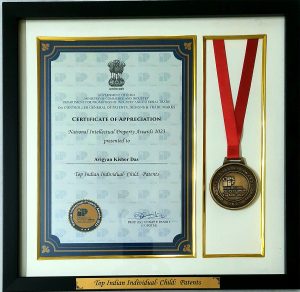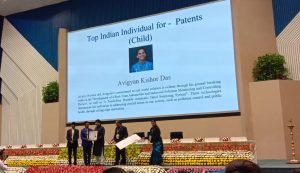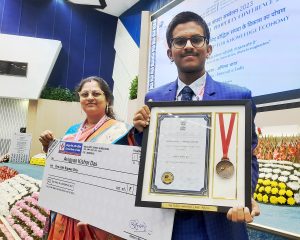New Delhi/Chinsurah, Oct. 13: Avigyan Kishor Das, 16, a class XII student from Hooghly’s Chinsurah, became the first Bengali, to have conferred with the prestigious National Intellectual Property awards this year.
Avigyan, a student of the science stream at the Hooghly Collegiate School in Chinsurah, was chosen for his commitment to path-breaking work on the “development of a real-time automobile and industrial pollution monitoring and controlling device” as well as “a touch-free portable automatic hand sanitizing system”, which aimed to offer a real-time solution to crucial issues our society faces due to pollution and public health, a communication issued by the Ministry stated.
 The award was handed over to Avigyan on Friday at Vigyan Bhavan in New Delhi by Pijush Goyal, Union Minister of Commerce and Industry. The award carries a cash award of Rupees one lakh apart from a trophy and citation. Speaking at the occasion, the minister appreciated the innovations and said, “Technology and innovative ideas are the twin engines of growth and Intellectual Property Right is the fuel that powers this engine of development”.
The award was handed over to Avigyan on Friday at Vigyan Bhavan in New Delhi by Pijush Goyal, Union Minister of Commerce and Industry. The award carries a cash award of Rupees one lakh apart from a trophy and citation. Speaking at the occasion, the minister appreciated the innovations and said, “Technology and innovative ideas are the twin engines of growth and Intellectual Property Right is the fuel that powers this engine of development”.
The awards introduced in the year 2009, are conferred in 13 different categories. Avigyan has been chosen as an individual in the category titled “Top Indian Individual for Patents” (Below 18 years). Earlier, only IIT Kharagpur from West Bengal received this award in 2016 for Top Academic Indian Institution for patents.
National Intellectual Property (IP) Awards are conferred every year to recognize and reward the top achievers comprising individuals, institutions, organizations, and enterprises, for their Intellectual property creations and commercialization, which have contributed towards strengthening the IP ecosystem in the country and encouraging creativity and innovation.
National IP Awards are intended to encourage innovation and management of intellectual property portfolio that influences the success of innovation in different industry segments, an official communication states.
During the past few years, Avigyan has invented a number of useful tools that aim to solve common men’s problems as well as some national interests. He has already bagged a patent for one of such inventions touch-free portable automatic hand sanitizing system), while approval is pending for eight others.
He has already bagged a patent for one of such inventions touch-free portable automatic hand sanitizing system), while approval is pending for eight others.
Son of Anindya Kishore Das, an employee of the Indian Audit & Accounts department, Avigyan wants to carry out research works in the field of artificial intelligence (AI) in IITs in the future. He has already worked with Intel India under the Responsible AI for Youth Programme, an initiative of the Ministry of Electronics and Information Technology (Government of India).
Speaking to NfN an elated Avigyan, said, “This award will inspire me a lot to undertake more such endeavors. I want to develop tools and systems using the basic science and technology in such a way so that many problems, which people and the society at large face regularly can be solved at an affordable cost”. His mother Priyanka Das, a homemaker said, “Avigyan has an inborn innovative mind since his childhood and developed many tools using basic science”.
 Four years ago Avigyan was adjudged first in competition organized at the India International Science Festival (IISF) 2019 in Calcutta for developing a real-time pollution control device that if fitted to the engine of a vehicle can eventually, disable its movement permanently once its pollution level goes beyond the permissible level.
Four years ago Avigyan was adjudged first in competition organized at the India International Science Festival (IISF) 2019 in Calcutta for developing a real-time pollution control device that if fitted to the engine of a vehicle can eventually, disable its movement permanently once its pollution level goes beyond the permissible level.
In 2019, while studying in class VII, Avigyan developed a device that can automatically stop a running train to avert a possible accident in case the driver suffers a cardiac arrest and collapses unconscious. The device, titled “Safety and Alert for Vulnerable Emergency” (SAVE) is based on “pulse oxymetre”, a small device that doctors often use to measure oxygen levels in the blood. This invention bagged the first prize for “Best Innovative Project”, in a competition-cum-tech-show organized by the Kalyani-based JIS College of Engineering.
Avigyan, a movie buff by passion, has also produced and directed a docu-drama film titled – Sushruta of Modern India, on the life and works of Madhusudan Gupta (1800-1856), a Bengali scholar and Ayurveda practitioner, who being trained in Western medicines, had performed the first human dissection in India in 1836 at the Kolkata Medical College. The film earned accolades for being screened at more than 15 renowned International and National Film Festivals including the International Science Film Festival of India(2021); National Science Film Festival of India(2022); Philadelphia Youth Film Festival (2023), Cinelearner International Film Festival.

